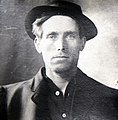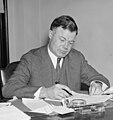Portal:Organized Labour

Introduction

- In trade unions, workers campaign for higher wages, better working conditions and fair treatment from their employers, and through the implementation of labour laws, from their governments. They do this through collective bargaining, sectoral bargaining, and when needed, strike action. In some countries, co-determination gives representatives of workers seats on the board of directors of their employers.
- Political parties representing the interests of workers campaign for labour rights, social security and the welfare state. They are usually called a labour party (in English-speaking countries), a social democratic party (in Germanic and Slavic countries), a socialist party (in Romance countries), or sometimes a workers' party.
- Though historically less prominent, the cooperative movement campaigns to replace capitalist ownership of the economy with worker cooperatives, consumer cooperatives, and other types of cooperative ownership. This is related to the concept of economic democracy.
The labour movement developed as a response to capitalism and the Industrial Revolution of the late 18th and early 19th centuries, at about the same time as socialism. The early goals of the movement were the right to unionise, the right to vote, democracy, safe working conditions and the 40-hour week. As these were achieved in many of the advanced economies of western Europe and north America in the early decades of the 20th century, the labour movement expanded to issues of welfare and social insurance, wealth distribution and income distribution, public services like health care and education, social housing and common ownership. (Full article...)
Selected article
Service Employees International Union (SEIU) is a labor union representing almost 1.9 million workers in over 100 occupations in the United States and Canada. SEIU is focused on organizing workers in three sectors: healthcare (over half of members work in the healthcare field), including hospital, home care and nursing home workers; public services (government employees, including law enforcement); and property services (including janitors, security guards and food service workers).
SEIU has over 150 local branches. It is affiliated with the AFL-CIO, the Strategic Organizing Center, and the Canadian Labour Congress. SEIU's international headquarters is located in Washington, D.C., and it is one of the largest unions in the country.
The union is known for its strong support for Democratic candidates. It spent $28 million supporting Barack Obama in the 2008 presidential election. In 2012, SEIU was the top outside spender on Democratic campaigns, reporting almost $70 million of campaign donations, television ads and get-out-the-vote efforts in support of President Obama and other Democrats. SEIU is a major supporter of the Affordable Care Act and of increased minimum wage laws, including wage increases for fast food workers. The union is the primary backer of the Fight for $15. (Full article...)
January in Labor History
Significant dates in labour history.
- January 01 - The 1966 New York City transit strike began; the United Transportation Union was founded; the Swedish Trade Union Confederation was founded; Union Network International was founded; the Workplace Relations Act 1996 entered into force in Australia
- January 02 - The Sago Mine disaster occurred in the 2006 in the U.S.
- January 03 - The 1929 Australian timber workers' strike began; Guy Ryder was born
- January 04 - The St. John's University strike of 1966–67 began in the U.S.; the Oil, Chemical and Atomic Workers International Union merged in 1999 with the United Paperworkers International Union to form the Paper, Allied-Industrial, Chemical and Energy Workers International Union
- January 05 - The 1891 Australian shearers' strike began; the 1919 Spartacist uprising began in Berlin
- January 07 - Edward T. Hanley died; A. P. T. James died
- January 08 - SEIU Local 1.on was founded
- January 09 - Maurice Hutcheson died; Sol Chick Chaikin was born
- January 11 - The 1912 Lawrence textile strike began in the U.S.; Paper, Allied-Industrial, Chemical and Energy Workers International Union merged with the United Steelworkers; Bogdan Borusewicz was born
- January 12 - Cornelius Shea died
- January 14 - The Reesor Siding strike of 1963 began in Canada; Joseph Glimco was born
- January 15 - Michael Sommer was born; the song "Solidarity Forever" is written; the Steel strike of 1959 ends in the U.S.
- January 16 - Dutta Samant was murdered; Leonard Woodcock died; Daniel John O'Donoghue died
- January 17 - Pablo Manlapit was born
- January 18 - The U.S. Supreme Court decided Moyer v. Peabody in 1909; Mary Kenney O'Sullivan died; the 1912 Brisbane general strike began in Australia; the Dublin Lock-out ended in 1914; Paul Keating was born; the Great Bombay textile strike began
- January 19 - Thomas Kennedy died; Morris Kight died; Bill Andersen died; Annie Buller died
- January 20 - The Tunisian General Labour Union was founded; trade unions launched the 2005 civil unrest in Belize; Harriot Eaton Stanton Blatch was born; Bruce Nissen was born
- January 21 - Edward T. Hanley was born; Bill Andersen was born; J. H. Thomas died; Nicholas Pollard Sr. died
- January 22 - The United Mine Workers was founded; Terence V. Powderly was born; Andrew Furuseth died; Chea Vichea was murdered; Gyula Peidl died; Ong Teng Cheong died
- January 23 - David Sullivan died; Nikolaus Gross died
- January 24 - The Wapping dispute began in 1986 in the U.K.; Emil Rieve died; the 1977 Massacre of Atocha occurred in Spain; Henri Krasucki died; Herbert Hill was born; the Supreme Court of Canada issued its reasoning in R.W.D.S.U., Local 558 v. Pepsi-Cola Canada Beverages (West) Ltd.; the Alliance for Labor Action was dissolved
- January 25 - The Sheet Metal Workers' International Association was founded; Matthew Woll was born; Chummy Fleming died
- January 26 - Bernard Kleiman was born
- January 27 - Samuel Gompers was born; the U.S. Supreme Court decided Lechmere, Inc. v. NLRB; Ben Tillett died; the U.S. Supreme Court decided Adair v. United States; Frank Tudor was born
- January 28 - Mike Quill died; Harry Lundeberg died; Mike Moore was born; James Scullin died
- January 29 - The Timex strike began in 1993 in Scotland; Anna LoPizzo died; John M. Dunn died
- January 30 - Edward Heitmann died
- January 31 - The 1919 Battle of George Square occurred in Scotland; New Orleans fired all members of the United Teachers of New Orleans in the wake of Hurricane Katrina; Bob Semple died
More Did you know (auto-generated)
- ... that Amazon Labor Union founder Chris Smalls was one of the leaders in the first successful effort to unionize Amazon warehouse workers in the United States?
- ... that during the 1913 El Paso smelters' strike the Industrial Workers of the World and the Western Federation of Miners competed to organize the strikers with their respective labor unions?
- ... that the communist trade unionist Ditto Pölzl was a member of all three provisional state governments of Styria in 1945?
- ... that John Sterling, Anthony Harrison and Chuck Compton were all signed by the Green Bay Packers as replacement players because of a players' strike during the 1987 NFL season?
- ... that when journalist and trade unionist Nisn Pups was released from jail, the Communist Party of Lithuania instructed him to change his name?
- ... that in 1977, Appalachian folk singer Phyllis Boyens performed at a Christmas benefit concert to support Kentucky coal miners who had been on strike for 17 months?
Related Portals
Selected image
Selected Quote
The hospital strikers have demonstrated that you don't get a job done unless you show the Man you're not afraid...If you're not willing to pay that price, then you don't deserve the rewards or benefits that go along with it." |
— Malcolm X. |
Did you know
- ...that Pierre Monatte was one of the few French trade-unionists and members of the French Left to oppose the Union sacrée national bloc during World War I?
- ...that the supply of natural gas and electricity in New Orleans, ceased as a result of the 1892 New Orleans general strike, plunging the city into darkness for four nights?
- ...that Benjamin Aaron helped negotiate the first contract between a county and its public employee union in California history in 1968?
Topics
Get involved
Also see our sister WikiProject, Housing and Tenant Rights!
Associated Wikimedia
The following Wikimedia Foundation sister projects provide more on this subject:
 Commons
Commons
Free media repository Wikibooks
Wikibooks
Free textbooks and manuals Wikidata
Wikidata
Free knowledge base Wikinews
Wikinews
Free-content news Wikiquote
Wikiquote
Collection of quotations Wikisource
Wikisource
Free-content library Wikiversity
Wikiversity
Free learning tools Wiktionary
Wiktionary
Dictionary and thesaurus




- Random portal



































































